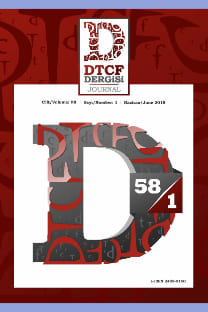NİETZSCHE VE ARİSTOTELES'TE “HAKİKAT” MESELESİ
THE PROBLEM OF “TRUTH” IN PHILOSOPHIES OF NIETZSCHE AND ARISTOTLE
___
- Aristoteles. Categories. Trans. Hugh Tredennick. Cambridge: Harward University Press, 1947.
- ---. Nichomachean Ethics. Trans. H. Rackham. Cambridge: Harward University Press, 1934.
- ---. On the Soul. Trans. W.S. Hett. Cambridge: Harward University Press, 1957.
- ---. The Metaphysics. Trans. Harold P. Cooke. Cambridge: Harward University Press, 1938.
- Bayar Bravo, Işıl. “Antikçağ’da Varlık ve Bilgi Problemleri Üstüne.” FLSF Dergisi 4.1 (2007): 43-58.
- Chouraqui, Frank. Ambiguity and the Absolute: Nietzsche ve Merleau-Ponty on the Question of Truth. New York: Fordham University Press, 2014.
- Deleuze, Gilles. Nietzsche and Philosophy. Trans. Hugh Tomlison. London, New York: Continuum, 2002.
- Foucault, Michel. Lectures on Will to Know and Oedipal Knowledge. Trans. Graham Burchell. Hampshire: Palgrave Macmillan, 2013.
- Lingis, Alphonso. “The Will to Power.” The New Nietzsche: Contemporary Styles of Interpretation. Ed. David B. Allison. New York: Dell Publishing, 1977.
- Marsden, Jill. After Nietzsche: Notes towards a Philosophy of Ecstasy. Hampshire and New York: Palgrave Macmillan, 2002.
- Nietzsche, Friedrich. Beyond Good and Evil. Trans. Reginal J. Hollingdale. Indianapolis, London: Penguin, 1990.
- ---. Dawn: Thoughts on the Presumptions on Morality. Trans. Brittain Smith. Stanford: Stanford University Press, 2011.
- ---. “On Truth and Lie in an Extra-Moral Sense.” Writings from the Early Notebooks.
- Eds. R. Geuss and A. Nehamas, trans. L. Löb. Cambridge: Cambridge University Press, 2009.
- ---. Philosophy in the Tragic Age of the Greeks. Trans. Marianne Cowan. Washington: Regnery Publishing, 1962.
- ---. The Gay Science. Trans. Walter Kaufmann. New York: Random House, 1974.
- ---. The Will to Power. Trans. Walter Kaufmann and Reginal J. Hollingdale. New York: Random House, 1968.
- ---. Twilight of Idols. Trans. Judith Norman. Cambridge: Cambridge University Press, 2005.
- ---. Untimely Meditations. Trans. Reginal J. Hollingdale. Cambridge: Cambridge University Press, 1997.
- ISSN: 0378-2905
- Yayın Aralığı: 2
- Başlangıç: 1942
- Yayıncı: Ankara Üniversitesi Dil ve Tarih-Coğrafya Fakültesi
FRANSIZ SEYYAHLARIN GÖZÜYLE KAFKASYA
EL-AHTAL'IN EMEVİLERE METHİYELERİ
A PICTORIAL UTOPIA: THE KELMSCOTT CHAUCER
STATE ORGANIZATION AND ELEMENTS OF THE REIGN IN NĪSHĀPŪRĪ'S SALJŪQNĀMA
MODERN POLONYA ROMANINDA YABANCI(LAŞMIŞ) BİR KADIN
CUMHURİYET DÖNEMİ İLK TÜRKÇE-FARSÇA SÖZLÜĞÜ FERHENG-İ MURTAZA ÜZERİNE BİR DEĞERLENDİRME
